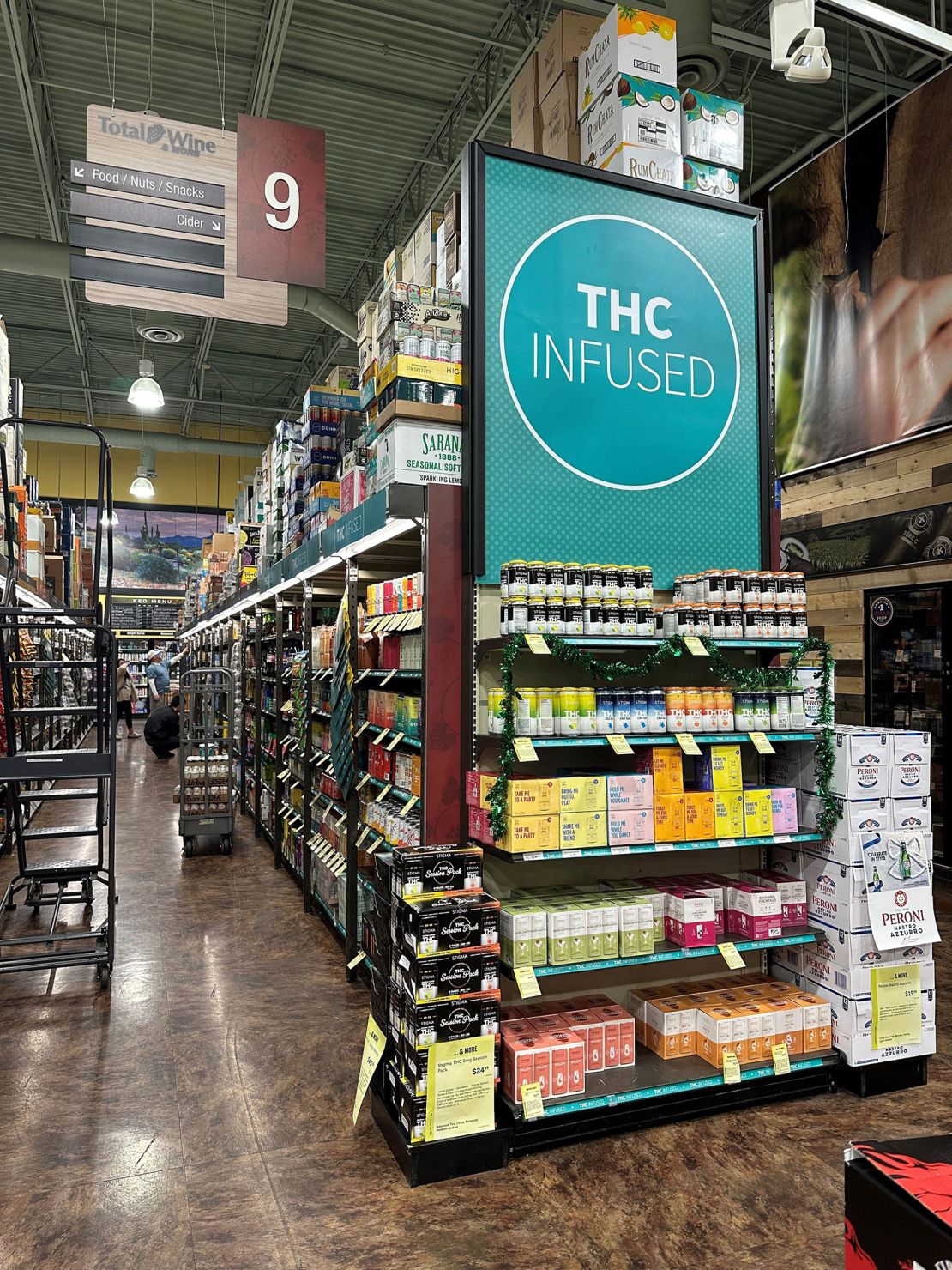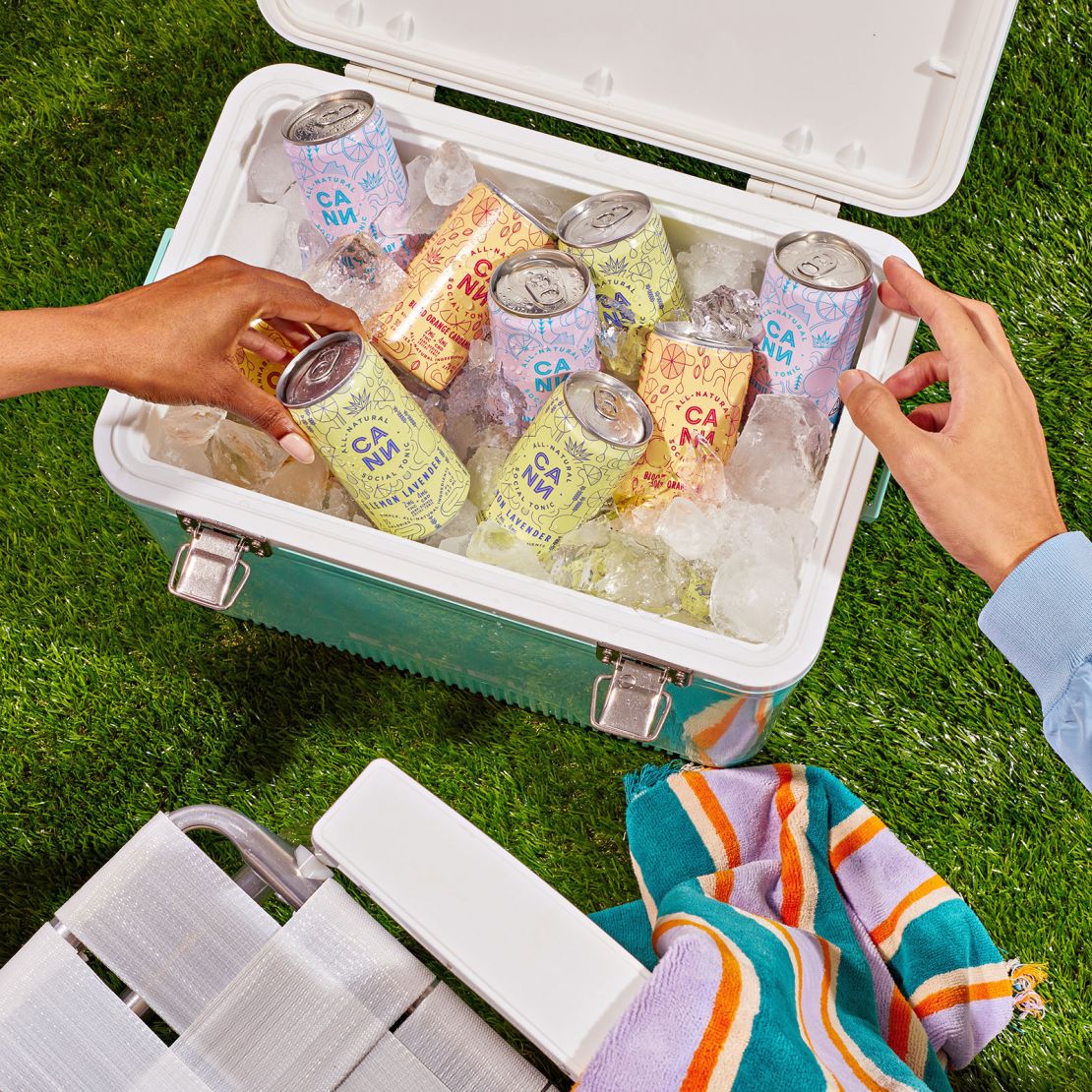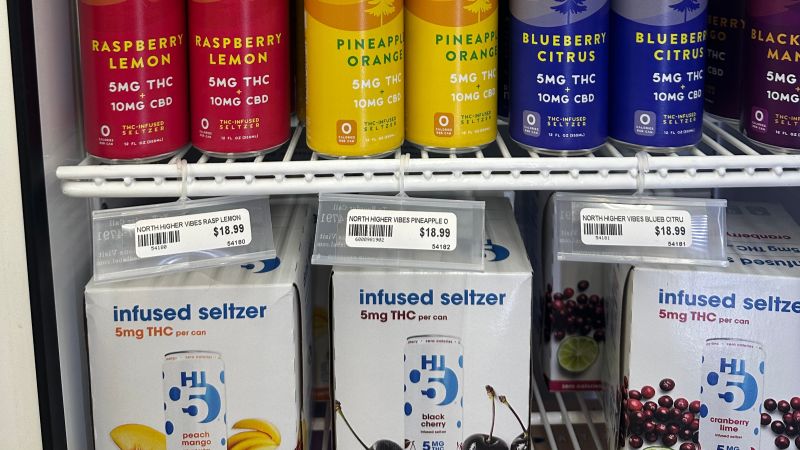New York
CNN
—
In June 2023, Jon Halper started selling THC beverages at Top Ten Liquors, his chain of Minnesota stores. The drinks, which contain the main intoxicating chemical compound found in cannabis, were a massive hit.
“Immediately, the sales took off,” said Halper. “We’ve never seen anything explosive like this.”
After just two years, THC beverages make up about 15% of overall sales, he said. “It’s hard to believe this growth isn’t going to be astronomical.”
The time is right for a THC beverage boom. Many Americans are embracing a California sober lifestyle — drinking less alcohol, which they see as harmful to health, and trying out marijuana instead. A study published in 2024 found that a higher number of Americans reported using cannabis every day than drinking alcohol daily.
And thanks to what many consider to be a loophole in the 2018 farm bill, THC beverage makers have been able to rapidly launch their products across the country with little oversight. Now, states are trying to make sense of the bill’s language, setting up their own regulations and raising questions for the future of the fast-growing industry.
For years, beverage companies toyed with the idea of using THC in drinks. But cannabis is a tricky business. Marijuana is a “schedule I controlled substance” in the United States, meaning companies that sell marijuana products legally don’t get certain tax benefits. The classification also makes it hard for those firms to get funding from financial institutions wary of breaking federal laws.
So drink makers avoided cannabis. Then the 2018 farm bill changed the game.
The lengthy document governs a wide range of agricultural and food assistance programs, and it includes a few pages that legalized the production of hemp, defined as a cannabis plant that has no more than 0.3% delta-9 THC on a dry-weight basis (cannabis plants with higher concentrations of THC are classified as marijuana). That language spawned a fast-growing market of technically legal THC beverages that are still potent enough to make you feel something.
At the time, “these drinks did not exist,” said Frank Colombo, managing director of Viridian Capital Advisors, which specializes in cannabis. “Nobody anticipated this whole category of hemp-based intoxicants, let alone hemp-based THC drinks.”

In 2020, the US market for hemp-derived THC drinks amounted to about $400,000, according to Brightfield Group, a consumer insights and market research firm that has been tracking the THC drink industry. By 2024, the market had grown nearly 10 times bigger, reaching $382 million dollars. This year, it will grow to $571 million, Brightfield predicts, with more expansion to come.
THC beverage makers have been exempt from the onerous regulations that apply to marijuana companies. But some entrepreneurs seek a Goldilocks zone for regulation: Too little could allow bad actors — those who market to children or sell high-dosage products made with synthetic ingredients — to proliferate, encouraging bans. Too much would constrain growth. But the right amount would legitimize their businesses, putting them on a path to skyrocketing growth.
Companies are betting that things will go their way. Experts are not so sure.
“I do not think it’s going to go perfectly,” said Hilary Bricken, an attorney with Husch Blackwell who focuses on the hemp and cannabis industries. She can “appreciate the confidence” of young companies trying to forge a path, but “it’s still going to be a bumpy road.”
When Cann first launched in 2019, the THC beverage was only available at a handful of cannabis dispensaries.
“At the time, we thought that was the only place you could sell these products,” explained Jake Bullock, co-founder and CEO of Cann. The drink had initially derived its THC and CBD, a non-psychoactive cannabinoid present in Cann drinks, from marijuana. Then in 2022, a new Minnesota law helped clarify the farm bill’s language, explicitly allowing certain hemp-derived THC products to be sold to customers aged 21 or older.
“We were like, ‘Well, wait, can we extract THC and CBD from hemp?’” Bullock recounted.
They could, and it took just 60 days. Cann launched the updated product in Minnesota in October of that year.
Today, Cann is sold in stores across 30 states and available direct-to-customer in at least 35 states. In 2024, revenue grew over 70%, according to the company. It expects over 100% growth this year.

Cann and other THC drink brands describe their products as social tonics, designed to give a light, mellow buzz that, they say, will help you feel good at parties but not hungover the next day. Cann’s drinks come in flavors like blood orange cardamom and yuzu elderflower and have no more than 10 milligrams of THC per can.
“If you think about alcohol and caffeine, we drink these in microdoses,” Bullock said. “There’s a reason you can have a few cups of coffee or a couple of glasses of wine. We wanted to capture that same kind of concept.”
Even shoppers who aren’t familiar with THC drinks are in the market for a new kind of beverage: Stroll down a refrigerator aisle and you’ll see prebiotic sodas in countless flavors, botanical teas, canned lattes with a variety of milks, sparkling everythings, non-alcoholic beers and more.
And over the past few years, Cann has been joined by scores of competitors.
For example, hi Seltzer, a calorie-free drink that comes in fruit flavors and contains five milligrams of THC, launched in 2023. “We’re running somewhere between 1.2 (million) and 1.5 million cans a month,” CEO Louis Police said in April, “which doesn’t even satisfy the demand.”

BRĒZ, a THC beverage brand that use lion’s mane mushroom extract, has seen sales explode since it started in 2023. In 2024, the company recorded about $28 million in revenue, said founder and CEO Aaron Nosbisch. This year, it’s on track to hit about $75 million.
The market has also attracted alcohol makers like Samantha Lee, co-founder of Hopewell Brewing Company in Chicago, Illinois. Last year, she and her Hopewell co-founders (plus one more) launched Choom, a sparkling canned THC beverage that comes in mostly citrus flavors.
“We’re seeing a lot of our current customer base who are really excited about (Choom),” she said.
Lee is optimistic that Illinois will regulate the market in a way that well help business thrive.
“We’re seeing a lot of positive movements in Illinois that will codify this as a law,” she said. But until that happens, major retailers may avoid selling brands like Choom. Without clear regulation, “there’s only so much we can do.”
The Hemp Beverage Alliance (HBA), a trade group formed two years ago, shares its own regulatory principles on labeling, dosing, age restrictions and more on its website. Brands are also educating distributors, retailers and consumers about their THC drinks. But self-regulation can only go so far.
“It’s going to be challenging for someone to truly break out… until there is something at the federal level that is a clear indication that these products can be scaled and will be legal,” said Duane Stanford, executive editor and publisher of Beverage Digest, a trade publication.
Ideally, there would be “a federal framework that guides the entire country” said Christopher Lackner, president of the HBA.
But that’s a moonshot, at least in the near term. For now, the alliance, which represents over 250 brands, retailers and distributors across North America, is working toward getting industry-friendly regulation at the state level.
Half of US states permit hemp-derived delta-9 THC beverages as of May 1, according to the HBA. The rest either severely limit THC content in these drinks, prohibit their sale outright or have not regulated the product, by the HBA’s count.
As states decide how to move forward, the federal government could crack down or make hemp illegal again.
“If the FDA starts getting increased accounts of, let’s say, kids getting ahold of this stuff, or consumers being misled (or) having adverse reactions,” it might set its own restrictions, said Bricken, the Husch Blackwell attorney.
Then there’s the question of the farm bill.
The current legislation has been extended through later this year. But if the administration decides to make hemp illegal in the next farm bill, it would have a chilling effect on the THC beverage industry, said Whitt Steineker, partner at Bradley and co-chair of the law firm’s cannabis industry team.
“You would see the money flow really dry up,” he said.
Halper, of Top Ten Liquors, isn’t quite sure what to expect from the federal government.
“We all talk about the next farm bill,” he said, adding: “None of us control what is happening in Washington.”

